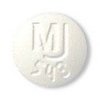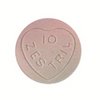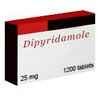INDICATIONS
Avalide is used for treating high blood pressure. Avalide is a combination angiotensin II receptor blocker and diuretic. The angiotensin II receptor blocker works by relaxing the blood vessels.
INSTRUCTIONS
Use Avalide as directed by your doctor.
- Avalide may be taken with or without food.
- Drinking extra fluids while you are taking Avalide is recommended. Check with your doctor for instructions.
- Avalide may increase the amount of urine or cause you to urinate more often when you first start taking it. To keep this from disturbing your sleep, try to take your dose before 6 pm.
- If you take cholestyramine or colestipol, ask your doctor or pharmacist how to take it with Avalide.
- Continue to take Avalide even if you feel well. Do not miss any doses.
- If you miss a dose of Avalide, take it as soon as possible. If it is almost time for your next dose, skip the missed dose and go back to your regular dosing schedule. Do not take 2 doses at once.
Ask your health care provider any questions you may have about how to use Avalide.
STORAGE
Store Avalide at 77 degrees F (25 degrees C). Brief storage at temperatures between 59 and 86 degrees F (15 and 30 degrees C) is permitted. Store away from heat, moisture, and light. Do not store in the bathroom. Keep Avalide out of the reach of children and away from pets.
MORE INFO:
Active Ingredients: Irbesartan hydrochlorothiazide.
Do NOT use Avalide if:
- you are allergic to any ingredient in Avalide or to any other sulfonamide medicine (eg, sulfamethoxazole)
- you are pregnant
- you have severe kidney problems or are unable to urinate
- you are taking dofetilide or ketanserin.
Contact your doctor or health care provider right away if any of these apply to you.
Some medical conditions may interact with Avalide. Tell your doctor or pharmacist if you have any medical conditions, especially if any of the following apply to you:
- if you are planning to become pregnant or are breast-feeding
- if you are taking any prescription or nonprescription medicine, herbal preparation, or dietary supplement
- if you have allergies to medicines, foods, or other substances
- if you have ever had a severe reaction (eg, swelling of the hands, face, lips, eyes, throat, or tongue; trouble swallowing or breathing; hoarseness) after taking any other angiotensin II receptor blocker or an angiotensin converting enzyme (ACE) inhibitor (eg, captopril)
- if you are dehydrated; have low blood volume; have low blood sodium, chloride, potassium, or magnesium levels; or have high blood calcium levels
- if you have asthma; diabetes; gout; heart problems (eg, congestive heart failure); liver, gall bladder, or kidney problems; high blood cholesterol or lipid levels; or systemic lupus erythematosus
- if you have recently had nerve surgery.
Some medicines may interact with Avalide. Tell your health care provider if you are taking any other medicines, especially any of the following:
- Dofetilide or ketanserin because the risk of irregular heartbeat may be increased
- Adrenocorticotropic hormone (ACTH), barbiturates (eg, phenobarbital), corticosteroids (eg, prednisone), diuretics (eg, furosemide), narcotic pain medicines (eg, morphine), or other medicines for high blood pressure because they may increase the risk of Avalide's side effects
- Cholestyramine, colestipol, or nonsteroidal anti-inflammatory drugs (NSAIDs) (eg, ibuprofen) because they may decrease Avalide's effectiveness
- Diazoxide, digoxin, lithium, nondepolarizing muscle relaxants (eg, tubocurarine), potassium, or potassium-sparing diuretics (eg, spironolactone) because risk of their side effects and toxic effects may be increased by Avalide
- Diabetes medicine (eg, glipizide, metformin), insulin, or pressor amines (eg, norepinephrine) because their effectiveness may be decreased by Avalide.
This may not be a complete list of all interactions that may occur. Ask your health care provider if Avalide may interact with other medicines that you take. Check with your health care provider before you start, stop, or change the dose of any medicine.
Important safety information:
- Avalide may cause drowsiness, dizziness, or lightheadedness. These effects may be worse if you take it with alcohol or certain medicines. Use Avalide with caution. Do not drive or perform other possible unsafe tasks until you know how you react to it.
- Avalide may cause dizziness, lightheadedness, or fainting; alcohol, hot weather, exercise, or fever may increase these effects. To prevent them, sit up or stand slowly, especially in the morning. Sit or lie down at the first sign of any of these effects.
- Report any lightheadedness or fainting to your doctor immediately. Your risk of lightheadedness or fainting may be increased if you experience diarrhea, vomiting, excessive sweating, if you do not drink enough fluids, or if you are on a low-salt diet.
- Patients who take medicine for high blood pressure often feel tired or run down for a few weeks after starting treatment. Be sure to take your medicine even if you may not feel normal. Tell your doctor if you develop any new symptoms.
- Avalide may cause you to become sunburned more easily. Avoid the sun, sunlamps, or tanning booths until you know how you react to Avalide. Use a sunscreen or wear protective clothing if you must be outside for more than a short time.
- Tell your doctor or dentist that you take Avalide before you receive any medical or dental care, emergency care, or surgery.
- If you have high blood pressure, do not use nonprescription products that contain stimulants. These products may include diet pills or cold medicines. Contact your doctor if you have any questions or concerns.
- Your doctor may have also prescribed a potassium supplement for you. If so, follow the dosing carefully. Do not start taking additional potassium on your own or change your diet to include more potassium without first checking with your doctor.
- Check with your doctor before you use a salt substitute or a product that has potassium in it.
- Diabetes patients - Avalide may affect your blood sugar. Check blood sugar levels closely. Ask your doctor before you change the dose of your diabetes medicine.
- Avalide may raise your blood sugar. High blood sugar may make you feel confused, drowsy, or thirsty. It can also make you flush, breathe faster, or have a fruit-like breath odor. If these symptoms occur, tell your doctor right away.
- Avalide may interfere with certain lab tests, including parathyroid function tests. Be sure your doctor and lab personnel know you are taking Avalide.
- Lab tests, including kidney function, blood pressure, and blood electrolytes, may be performed while you use Avalide. These tests may be used to monitor your condition or check for side effects. Be sure to keep all doctor and lab appointments.
- Use Avalide with caution in the elderly; they may be more sensitive to its effects.
- Avalide should be used with extreme caution in children; safety and effectiveness in children have not been confirmed.
- Pregnancy and breast-feeding: Avalide may cause birth defects or fetal death if you take it while you are pregnant. If you think you may be pregnant, contact your doctor right away. Avalide is found in breast milk. Do not breastfeed while taking Avalide.
All medicines may cause side effects, but many people have no, or minor, side effects.
Check with your doctor if any of these most common side effects persist or become bothersome:
Dizziness; nausea; tiredness; vomiting.
Seek medical attention right away if any of these severe side effects occur:
Severe allergic reactions (rash; hives; difficulty breathing; tightness in the chest; swelling of the mouth, face, lips, or tongue); chest pain; confusion; decrease in sexual ability; depression; drowsiness; fainting; fast or irregular heartbeat; fever, chills, or persistent sore throat; decreased urination; hoarseness; muscle pain, tenderness, or cramps; red, swollen, blistered, or peeling skin; restlessness; seizures; severe or persistent dry mouth; severe or persistent vomiting; shortness of breath; swelling of the arms or legs; unusual bruising or bleeding; unusual thirst; unusual tiredness or weakness; yellowing of the skin or eyes.
This is not a complete list of all side effects that may occur. If you have questions about side effects, contact your health care provider.

 Vasotec$0.56 for pillVasotec is used for treating high blood pressure, heart failure, and other heart problems. More info
Vasotec$0.56 for pillVasotec is used for treating high blood pressure, heart failure, and other heart problems. More info Adalat$0.31 for pillAdalat is used to treat hypertension (high blood pressure) and angina (chest pain). More info
Adalat$0.31 for pillAdalat is used to treat hypertension (high blood pressure) and angina (chest pain). More info Vasodilan$0.56 for pillVasodilan is used for improving blood flow in some conditions (eg, cerebral vascular insufficiency, arteriosclerosis obliterans, Buerger disease, Raynaud disease). More info
Vasodilan$0.56 for pillVasodilan is used for improving blood flow in some conditions (eg, cerebral vascular insufficiency, arteriosclerosis obliterans, Buerger disease, Raynaud disease). More info Zestril$0.34 for pillZestril is used for treating high blood pressure alone or with other medicines. More info
Zestril$0.34 for pillZestril is used for treating high blood pressure alone or with other medicines. More info Dipyridamole$0.37 for pillDipyridamole is used for evaluating coronary artery disease in patients who cannot exercise adequately before thallium imaging (cardiac blood flow scan). More info
Dipyridamole$0.37 for pillDipyridamole is used for evaluating coronary artery disease in patients who cannot exercise adequately before thallium imaging (cardiac blood flow scan). More info Lisinopril$0.41 for pillLisinopril is used for treating high blood pressure alone or with other medicines. More info
Lisinopril$0.41 for pillLisinopril is used for treating high blood pressure alone or with other medicines. More info